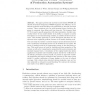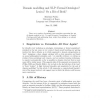2024 search results - page 44 / 405 » A Formal Model of Multi-agent Computations |
122
click to vote
BMCBI
2010
14 years 11 months ago
2010
Background: Several diseases, many of which nowadays pandemic, consist of multifactorial pathologies. Paradigmatic examples come from the immune response to pathogens, in which ca...
105
click to vote
DFG
2004
Springer
15 years 2 months ago
2004
Springer
This paper presents the real-time model checker RAVEN and related theoretical background. RAVEN augments the efficiency of traditional symbolic model checking with possibilities to...
100
Voted
APIN
2006
14 years 11 months ago
2006
Biologists are building increasingly complex models and simulations of cells and other biological entities, and are looking at alternatives to traditional representations. Making ...
103
click to vote
ICCS
2007
Springer
15 years 2 months ago
2007
Springer
In e-Science, scientific workflow systems are used to share data and knowledge in collaborative experiments. In recent work we discussed the concepts of a workflow bus [1], allowin...
83
Voted
AO
2005
14 years 11 months ago
2005
There are a number of genuinely open questions concerning the use of domain models in nlp. It would be great if contributors to Applied Ontology could help addressing them rather ...


